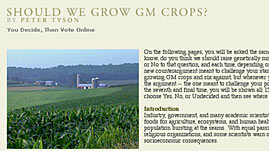From cattle to corn, pumpkins to pigs, humans have been modifying the genetic makeup of organisms for thousands of years. Using the techniques of selective breeding and cross-pollination, agriculturists have effectively speeded up the process of natural selection and shaped the attributes of nearly all of the domestic species we know today. Cross-breeding two individuals that share a set of desirable traits -- rapid growth and a strong immune system, for example -- typically results in offspring that have a better-than-average mix of those traits. And by continuing to select individuals with those traits, the traits become increasingly standard to the breed.
Geneticists have similarly altered the physical and chemical characteristics of organisms, but even more quickly and significantly than classic breeders ever could. The technique geneticists use is called transgenic manipulation. This technique owes to the fact that all organisms -- mammals, insects, plants, and bacteria -- have large numbers of genes in common. And scientists now know where many of these genes are and what they do. This means that it is now possible to find the portions of an animal's genome that are instrumental in, for instance, the production of milk, and insert genes that will change the makeup of that milk. The effect, according to proponents of transgenic manipulation, is predictable and immediate, and no other portion of the animal's genome need be affected.
So, now we know it is possible to place genes from one type of organism into the genome of another. Scientists do so almost routinely these days. And by now, knowingly or not, most of us have been consuming genetically modified (GM) foods for years. Worldwide sales of GM foods skyrocketed from an estimated $75 million in 1995 to a staggering $2.3 billion in 1999.
The question today, obviously, is not whether we can change the genetic makeup of organisms through transgenic manipulation, but whether we should continue to do so. Industry, government, and many academic scientists tout the benefits of GM foods for agriculture, ecosystems, and human health and well-being (not the least of which is feeding a world population bursting at the seams). With equal passion, however, consumer groups, environmental activists, religious organizations, and many scientists warn of unforeseen health, environmental, and socioeconomic consequences.
For now, it's too early to know which of the predictions for GM foods will materialize. In the meantime, transgenic technology raises difficult scientific, ethical, legal, and economic questions that need to be thoroughly debated.


 Loading Standards
Loading Standards Teachers' Domain is proud to be a Pathways portal to the National Science Digital Library.
Teachers' Domain is proud to be a Pathways portal to the National Science Digital Library.
